Paolo Bettini
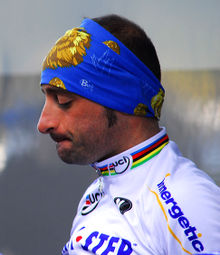 Paolo Bettini in 2007 |
||||||||||||||||||||||||||||
| Personal information | ||||||||||||||||||||||||||||
|---|---|---|---|---|---|---|---|---|---|---|---|---|---|---|---|---|---|---|---|---|---|---|---|---|---|---|---|---|
| Full name | Paolo Bettini | |||||||||||||||||||||||||||
| Nickname | Grillo | |||||||||||||||||||||||||||
| Date of birth | April 1, 1974 | |||||||||||||||||||||||||||
| Country | ||||||||||||||||||||||||||||
| Height | 1.69 m (5 ft 6 1⁄2 in) | |||||||||||||||||||||||||||
| Weight | 58 kg (130 lb; 9.1 st) | |||||||||||||||||||||||||||
| Team information | ||||||||||||||||||||||||||||
| Discipline | Road | |||||||||||||||||||||||||||
| Role | Rider | |||||||||||||||||||||||||||
| Rider type | Classics specialist/Sprinter | |||||||||||||||||||||||||||
| Professional team(s) | ||||||||||||||||||||||||||||
| 1997 1998 1999–2002 2003–2008 |
MG-Technogym Asics Mapei Quick Step |
|||||||||||||||||||||||||||
| Major wins | ||||||||||||||||||||||||||||
|
||||||||||||||||||||||||||||
|
||||||||||||||||||||||||||||
| Infobox last updated on 29 January 2009 |
||||||||||||||||||||||||||||
Paolo Bettini (born April 1, 1974 in Cecina, Livorno, Tuscany) is a former Italian champion road racing cyclist. Considered the best classics specialists of his generation, and probably one of the strongest of all times, he won gold medals in the 2004 Athens Olympics road race and in the 2006 and 2007 World Road Race Championships. He is nicknamed Il Grillo ("the cricket") for his repeated sudden attacks and his sprinting style.
He gained prominence by winning Liège-Bastogne-Liège in 2000 and 2002. He set the record for World Cup wins in a season in 2003, winning the Milan-Sanremo, HEW Cyclassics and Clásica de San Sebastián. He won the Giro di Lombardia in 2005 and 2006, the Züri-Metzgete in 2001 and 2005 and Tirreno-Adriatico in 2004.
Contents |
Early career
Paolo Bettini lived with his family on the Tuscany coast. He began racing when he was seven and won 23 of his first 24 races[1]. His first bike had a secondhand frame which his father, Giuliano, had painted orange. The components were cannibalised from other bikes.[1] He started racing after the encouragement of his brother.[2]
He came fourth in the world under-23 road championship in 1996, behind three other Italians, Giuliano Fugeras, Roberti Sgambelluri and Luca Sironi[3]. He turned professional the following year for the MG-Technogym team. There he rode as domestique to Michele Bartoli, "a working class cyclist," wrote Stephen Farrand, "destined to work for others to earn his crust."[1] He worked for Bartoli, who in return helped with advice. [4] Bartoli won the World Cup in 1997 and 1998 with Bettini's help.
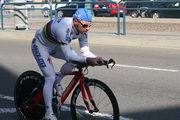
Bartoli fell heavily on a knee in 1999 and Bettini was freed to race for himself[5]. He won Liège-Bastogne-Liège in 2000 - treating himself to a €100,000 Porsche[1] - and a flat stage of that year's Tour de France, from Agen to Dax. He won the 2001 Züri-Metzgete after a few months without wins, beating Jan Ullrich in the sprint to the finish. His success led to a feud with Bartoli. It culminated in the 2001 world championship in Lisbon, Portugal, where Bartoli refused to lead Bettini to a flying start in the sprint finish and the Spaniard, Oscar Freire, won instead.
2002 World Cup and race season
The 2002 season was a breakthrough. In the World Cup, Bettini was caught in the final kilometers of Milan-Sanremo. After his 1-2 win with Stefano Garzelli in Liège-Bastogne-Liège, Bettini ran neck-to-neck against Museeuw, who won Paris-Roubaix in a 50 km solo breakaway, and the HEW Cyclassics. A tactical ride in Giro di Lombardia earned Bettini the World Cup.
Bettini played strong support in Mario Cipollini's victory in the UCI Road Cycling World Championship in Zolder, Belgium.
2003 World Cup and race season
The 2003 World Cup series started with Milan-Sanremo. Attacking twice in the last hills leading down to the Primavera, Bettini had the help of Luca Paolini, who attacked down the tricky descent towards the finish.
However, injury in the Gent-Wevelgem forced Bettini to miss several races until the Tour de France in July.[6] He then followed with a win in the HEW Cyclassics in front of Tour runner-up Jan Ullrich, and a win in the Clásica de San Sebastián.
Bettini failed to win the UCI Road Cycling World Championship despite being favorite due to a mistake at the end of the race. Having established himself in the winning breakaway, hesitation allowed the Spaniard Igor Astarloa to break away to win. Astarloa claimed that Bettini had offered him money to relinquish the win, which Astarloa said he refused. A feud ensued, and Astarloa attributed his comment to a misunderstanding of Bettini's Italian [7].
2004 World Cup and race season
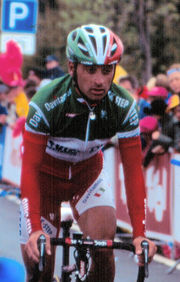
The 2004 season started well with Milan-Sanremo, but Davide Rebellin won the La Flèche Wallonne (not in the World Cup), Liège-Bastogne-Liège and Amstel Gold Race. Bettini's disappointments continued with second places in the HEW Cyclassics, which he had won previously, and in the Clásica de San Sebastián, which he had won the previous year. The points gained in Paris-Tours put him in the leader's jersey, but with the last race the Giro di Lombardia better suited to Rebellin, the World Cup was not yet safe. Bettini followed Rebellin throughout the race, resulting in Rebellin's quitting in frustration.
Bettini's most important victory was the 2004 Summer Olympics, where he broke away with one other rider for a comfortable victory. He again failed to win the world championship due to an injury when he banged his knee against the team car at the beginning of the race.
2005 UCI ProTour and race season
After Milan-Sanremo, Bettini had an injury-marked start which prevented significant participation in the spring classics, and he had no victories until he got two stage wins at the 2005 Giro d'Italia, where he wore the maglia rosa for several days. After that, no more good results until the 2005 Vuelta a España, where he beat Alessandro Petacchi in an uphill sprint in Valladolid. After that, he took part in the world championship in Madrid, where he got into the decisive break but did not get a medal. A week later, he won Züri-Metzgete for a second time. Two weeks later he won the Giro di Lombardia as well.
2006 UCI ProTour and race season
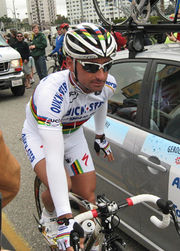
Bettini won the first race of the season, the Trofeo Soller, which is part of the Challenge Mallorca. He also won the Gran Premio di Lugano, two stages in the Tirreno-Adriatico and the 15th stage in the Giro d'Italia, where he won the points classification (maglia ciclamino). Following the Giro he became the Italian road champion and won a stage at the Vuelta a España before winning the world championship.
His brother Sauro died in a car accident a few days after that victory and Bettini was close to abandoning cycling. He changed his mind and won the Giro di Lombardia in tears.
On 2 March 2007, the French magazine Velo awarded Bettini its Velo d'Or as best rider of 2006.[8]
2007 UCI ProTour and race season
Bettini raced in the second annual 2.HC-rated 2007 Tour of California and made it worth his while by capturing Stage 4 in a sprint finish. He later won the third stage of the Vuelta a España and finished second in three more stages. Then he won once again the rainbow jersey of the Elite Men's Road at Stuttgart.
2008 season
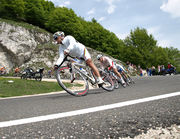
Bettini's start was plagued by injuries, including a fall at the Kuurne-Brussels-Kuurne and a rib broken when he fell on a wet descent in the Vuelta al País Vasco.[9] He won the Trofeo Matteoti and stages at the Österreich Rundfahrt and Tour de Wallonie. He also won two stages at the Vuelta a España, where he said he was leaving Quick Step after 10 years due to a financial dispute.[10] On September 27 he announced his retirement[11]. On 4 November, he fell during the Milan six-day and was taken to hospital uncounscious. [12].
Track racing
Bettini followed the path of riders before the 1970s and took up six-day racing in the winter. He rode at Munich and Grenoble in 2006. "I didn't do it for the money," he said. "I had that already. I did it through my love of racing, to see what it's like to race on a track."[13] The bankings proved trickier than the road, however, and his debut was described as "catastrophic" as he failed to get alongside his partner in the two-man relay race, the madison, and finished the first night "with fear in his face."[14] Charly Mottet said:
- I saw him at the start of the evening and he worried me. Two hours later, I can tell you, he had won the respect of the others. He was making proper changes[15], he was taking part in the race and he was going better and better. The others couldn't believe their eyes [commencaient à ne plus voir le jour]. ."[16]
Personal life
Bettini married Monica Orlandini, a literature teacher, in 2000. They moved into a farmhouse belonging to his wife's family, who have been olive farmers for four generations.[2] They live in Riparbella, 10 km from Cecina, where Bettini was born.
Palmarès
UCI Road Race World Championships Winner (2007)
UCI Road Race World Championships Winner (2006)
 Gold Medal – Olympics Men's Road Race (2004)
Gold Medal – Olympics Men's Road Race (2004) Season Champion – UCI Road World Cup (2002, 2003, 2004)
Season Champion – UCI Road World Cup (2002, 2003, 2004) Italian National Road Race Championship (2003, 2006)
Italian National Road Race Championship (2003, 2006)- 1 stage win – 2000 Tour de France
- 1 stage win – 2006 Giro d'Italia
 Maglia ciclamino points classification (Final)
Maglia ciclamino points classification (Final)
- 1 stage win – 2005 Giro d'Italia
 Maglia ciclamino – points classification (Final)
Maglia ciclamino – points classification (Final) Maglia rosa – general classification (after Stages 1, 3, 4 and 6)
Maglia rosa – general classification (after Stages 1, 3, 4 and 6)
- 2 stage win – 2008 Vuelta a España
- 1 stage win – 2007 Vuelta a España
- 1 stage win – 2006 Vuelta a España
- 1 stage win – 2005 Vuelta a España
- Milan-Sanremo (2003)
- Liège-Bastogne-Liège (2000, 2002)
- Giro di Lombardia (2005, 2006)
- Clásica de San Sebastián (2003)
- HEW Cyclassics Cup (2003)
- Züri-Metzgete (2001, 2005)
- 1 stage win – 2004 Tour de Suisse
- 1 stage win – 1998 Tour de Romandie
- 2 stage wins – 2006 Tirreno-Adriatico
- Overall and 2 stage wins – 2004 Tirreno-Adriatico
- 1 stage win – 2002 Tirreno-Adriatico
- 1 stage win – 1999 Tirreno-Adriatico
- Overall and Points classification – Tour Méditerranéen (2003)
- 1 stage win – 2007 Tour of California
- Tour de Wallonie (2002)
- Tour du Latium (2002)
- Tour de la province de Lucques (1999)
- Memorial Cecchi Gori (2000)
- Tour de la Riviera Ligure (2002)
- Gran Premio di Lugano (2006)
- Vuelta a Mallorca Trofeo Sóller (2006)
- Gran Premio Città di Camaiore (2004)
- Giglio d'Oro (2004)
- Mendrisio d'Or award (2003)
- Coppa Sabatini (2002)
- Coppa Placci (2001)
- Championship of Tuscany (amateur) (1999)
- Hofbrau Cup - Team Time Trial (1997)
External links
| Sporting positions | ||
|---|---|---|
| Preceded by Tom Boonen |
UCI Road Race World Champion 2006, 2007 |
Succeeded by Alessandro Ballan |
| Preceded by Erik Dekker |
UCI Road World Cup Champion 2002, 2003, 2004 |
Succeeded by Danilo Di Luca UCI ProTour Champion |
| Awards | ||
| Preceded by Tom Boonen |
Vélo d'Or 2006 |
Succeeded by Alberto Contador |
|
|||||
|
|||||
References
- ↑ 1.0 1.1 1.2 1.3 Cycling Weekly, UK, May 2002
- ↑ 2.0 2.1 Procycling, UK, November 2001
- ↑ L'Équipe, France, 10 July 2000
- ↑ L'Équipe, France, 10 July 2000
- ↑ Vélo, France, December 2006
- ↑ Bettini to miss classics, April 15, 2003 cyclingnews.com
- ↑ On Astarloa, Bettini and the ... bribe farce - dailypeloton.com
- ↑ http://www.velonews.com/race/int/articles/11803.0.html Velonews.com EuroFile
- ↑ VeloNews - Paolo Bettini breaks a rib in Pais Vasco crash - April 12, 2008.
- ↑ Stage 12 - September 11: Burgos - Suances, www.cyclingnews.com
- ↑ Italian Cycling Legend Paolo Bettini Announces His Retirement After Title Defence
- ↑ [1]
- ↑ Vélo, France, December 2006
- ↑ Vélo, France, December 2006
- ↑ In a madison race, one rider races as the other circles the track slowly, to rest. The faster rider grabs the slower by the hand and hurls him into the race. It demands not only acrobatic skill and strength but the talent to get near the other rider in the first place, riding at 50kmh on a 250m track with up to 30 riders moving at different speeds.
- ↑ Vélo, France, December 2006